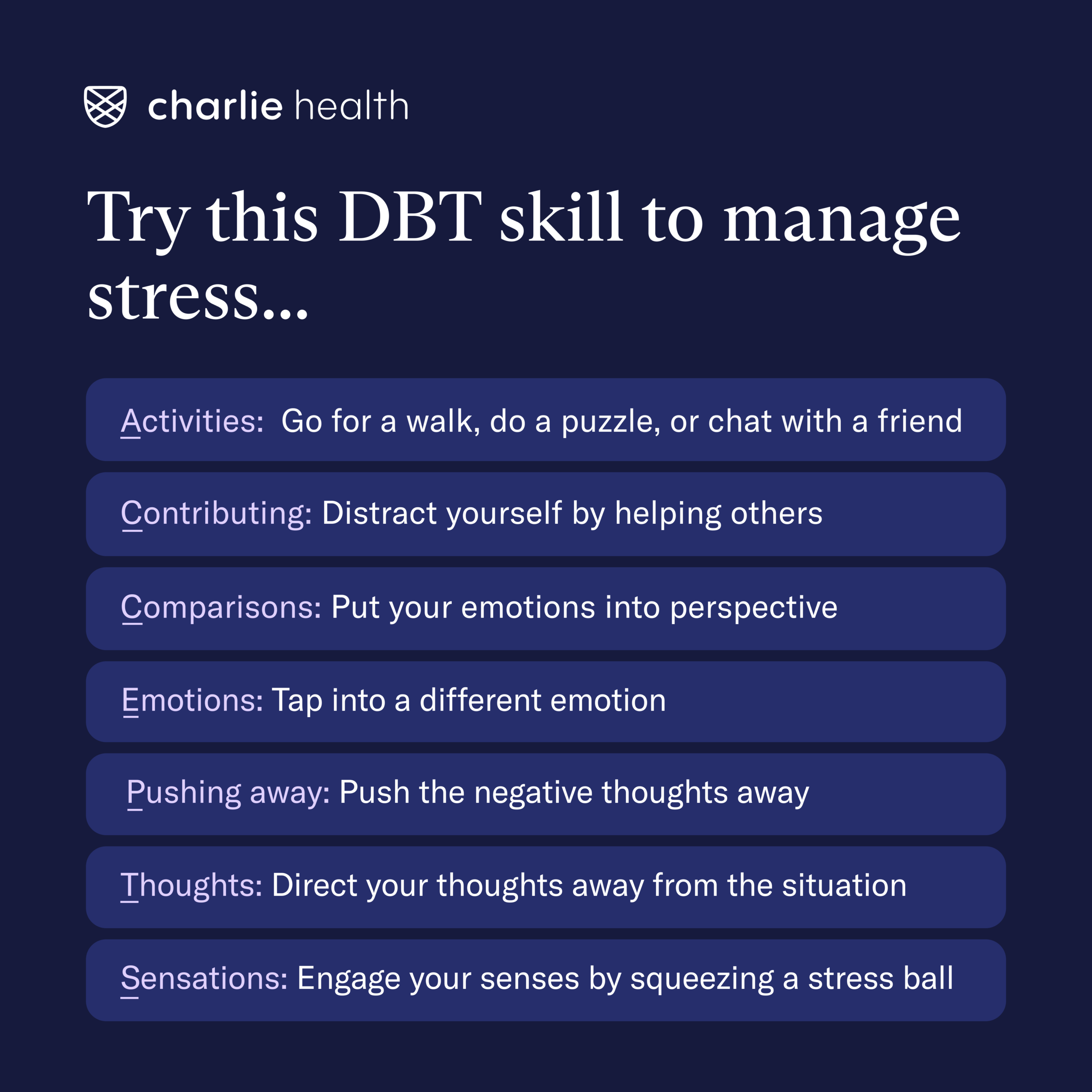
Table of Contents
ACCEPTS: A Useful DBT Skill for Stress
Written By: Charlie Health Editorial Team

Clinically Reviewed By: Dr. Don Gasparini
Updated: April 12, 2024
4 min.
ACCEPTS is a DBT skill you can use in everyday life to manage stress and improve overall mental health.
Learn more about our Clinical Review Process
Table of Contents
Dialectical behavior therapy (DBT) — a type of cognitive behavioral therapy (CBT) based on the concepts of mindfulness and acceptance — has gained popularity for its emphasis on practical skills, which can be used to treat a range of mental health conditions.
One of the skills taught in DBT is ACCEPTS, an acronym that stands for activities, contributing, comparisons, emotions, pushing away, thoughts, and sensations. It represents coping strategies to manage challenging emotions and situations. Below, we explore what DBT ACCEPTS is, how it’s used, and its benefits in managing stress.
Join the Charlie Health Library
Get mental health updates, research, insights, and resources directly to your inbox.
You can unsubscribe anytime.
What is DBT ACCEPTS?
As mentioned, ACCEPTS is a DBT skill to help people manage distress. Each of these components is designed to help people manage their emotions and stress in a healthy way. Here’s a breakdown of what ACCEPTS stands for:
- A: Activities — Engaging in activities that distract you from distressing thoughts or emotions, such as hobbies, exercise, or other useful coping skills.
- C: Contributing — Doing something kind or helpful for someone else. Helping others can shift your focus away from your own distress and provide a sense of purpose.
- C: Comparisons — Comparing your current situation to a time when you coped successfully or to someone who is worse off. This can help put your current distress into perspective.
- E: Emotions — Engaging in activities that evoke different emotions, such as watching a funny movie or listening to uplifting music. Changing your emotional state can help shift your perspective on the situation.
- P: Pushing away — Temporarily putting aside distressing thoughts or emotions by mentally pushing them away. This can be useful when you're unable to address the situation immediately and need a break from intense emotions.
- T: Thoughts — Redirecting your thoughts away from distressing topics by focusing on something neutral or positive. This can involve mindfulness techniques or visualization exercises.
- S: Sensations — Engaging in sensory experiences that are soothing or pleasurable, such as taking a warm bath, listening to calming music, or using aromatherapy.

An example of the ACCEPTS skill being used
Let's say someone is experiencing a lot of stress and anxiety before an important presentation at work. They decide to use the ACCEPTS DBT skill to help manage their emotions:
- Activities — Before the presentation, they engage in a short mindfulness exercise to calm their mind and focus their attention.
- Contributing — They offer to help a colleague with a small task, which shifts their focus away from their own anxiety and allows them to feel a sense of accomplishment.
- Comparisons — They remind themselves of a previous successful presentation they gave, reassuring themselves that they have the skills and experience to handle this one.
- Emotions — They take a few minutes to listen to their favorite uplifting music, which helps boost their mood and confidence.
- Pushing away — When negative thoughts about the presentation arise, they visualize putting those thoughts in a mental box and setting it aside, allowing themselves to temporarily let go of their worries.
- Thoughts — They practice positive self-talk, reminding themselves of their strengths and abilities and visualizing a successful outcome for the presentation.
- Sensations — They take deep breaths and focus on the physical sensations of relaxation, such as the feeling of their breath entering and leaving their body, to help them stay calm and grounded.

What are other DBT skills?
In addition to the ACCEPTS skill, there are many other skills taught in DBT to help people cope with distress and improve their overall well-being. These skills are taught in DBT therapy sessions and are designed to empower individuals to cope with distressing emotions, improve relationships, and live more fulfilling lives. They are organized into four main modules, which represent the four tenets of DBT:
Mindfulness skills
These skills help people become more aware of their thoughts, emotions, and sensations in the present moment without judgment. Examples include observing, describing, and participating before taking action.
Distress tolerance skills
These skills focus on helping people tolerate and survive crises without making the situation worse. Examples include "IMPROVE the moment,” which helps people manage big emotions and radical acceptance, the practice of accepting things as they are.
Emotion regulation skills
These skills teach people how to understand and manage their emotions effectively. Examples include “opposite action,” which encourages people to do the opposite of what their emotional instincts are during high-stress situations.
Interpersonal effectiveness skills
These skills help individuals communicate assertively, set boundaries, and navigate interpersonal relationships more effectively. Examples include "DEAR MAN," which is focused on communication, and “FAST,” which helps people during conflict.

Dialectical behavior therapy with Charlie Health
If someone in your life could use structured, skills-based therapy to manage mental health, Charlie Health is here to help. Charlie Health’s virtual Intensive Outpatient Program (IOP) provides more than once-weekly mental health treatment for young people and families dealing with serious mental health conditions. Our expert clinicians incorporate evidence-based therapies, including dialectical behavior therapy, into individual counseling, family therapy, and group sessions. With this kind of holistic treatment, managing your mental health is possible. Fill out the form below or give us a call to start healing today.





